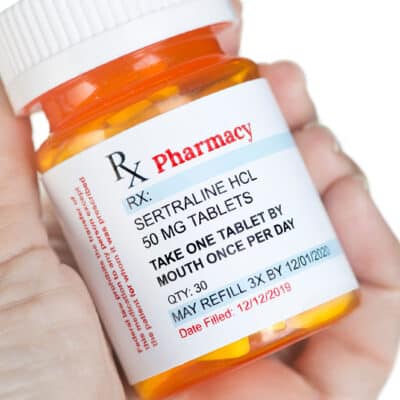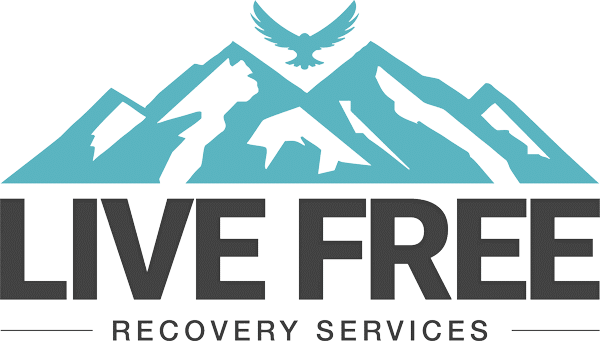Sertraline is the scientific name of Zoloft, a drug used to treat depression. It’s classified as a selective serotonin reuptake inhibitor or SSRI and is effective in treating depressive episodes as it helps regulate mood.
Nevertheless, there’s a lot of controversy regarding taking Zoloft. Some people develop a dependence on this drug and start experiencing withdrawal symptoms when they stop taking it. Some might even experience more depression and anxiety. So, can you get addicted to Zoloft?
This article will dig into the nature of Zoloft, explain its side effects, and discuss the Zoloft addiction treatment options in New Hampshire. So, keep reading.
Table of Contents
What is Zoloft?

Zoloft is a medication developed by Pfizer in 1991 to treat mental disorders like depression, obsessive-compulsive disorder, panic attacks, post-traumatic stress disorder, social anxiety disorder, and panic attacks. It helps alleviate discomfort and physical symptoms in severe cases of premenstrual syndrome and can be given to children with severe OCD symptoms.
Sertraline or Zoloft belongs to a classification of drugs called SSRIs, which help restore the balance of serotonin in the brain. By increasing the levels of serotonin in the brain, people can feel more comfortable and functional.
Zoloft is available in tablet or liquid forms. The pills come in different concentrations, from 25 milligrams to 200 milligrams, and can be taken with or without food.
Most patients take the tablet once in the morning or at night, and the dose is determined according to the body’s response and the disorder this medication is used to treat. Ideally, the doctor will start with the lowest dose and monitor progress.
The liquid form comes in a single concentration of 20 milligrams. The patient should mix it with another liquid before taking the medicine.
Taking Liquid Zoloft
Your doctor will prescribe the safest way to take this medication. The medication comes with a dropper, and you add the recommended number of drops to ½ a cup of 4 ounces of water, lemonade, orange juice, lemon-lime soda, or ginger ale.
The mixture will become cloudy, and this is perfectly normal. It should be taken right away, as you shouldn’t prepare your Zoloft drink in advance.
One study showed that taking small amounts of caffeine might improve treatment results. This is why some medical professionals advise patients to take their Zoloft with a little coffee.
Is Zoloft Addictive?
Zoloft is a prescription medication that people naturally take for months and even years. So, it’s natural that people become dependent on the drug, as their brains are unable to manage serotonin levels on their own.
However, medical studies don’t show that Zoloft is addictive. Studies show that Zoloft is safe when taken according to the doctor’s instructions, and it’s well tolerated by the body.
Yet, because patients become dependent, some people experience withdrawal-like syndrome when they stop taking the drug abruptly. In some cases, some people will continue to use Zoloft even when their doctor has advised them to stop. They can try to forge prescriptions or try to get the drug illegally.
Other symptoms of Zoloft dependence include faking symptoms to continue using the drug, paying more money for the drug, and using the drug in more doses to achieve the desired result.
Serotonin Syndrome
Whether you’re using the tablet or liquid form, medical professionals advise against taking Zoloft with alcohol. The interaction between Zoloft and alcohol can be dangerous. One study showed that the consumption of alcohol while taking this medication resulted in more irritability and violent behavior.
Alcohol increases serotonin levels, just like Zoloft. As a result, the patient can suffer from several side effects due to the increase of serotonin, leading to what is known as Serotonin Syndrome.
Patients can also suffer from serotonin syndrome if they mix Zoloft with another medication like a migraine medicine. Avoid these medications and seek medical help if the symptoms persist or get worse.
- Other SSRIs, like Prozac, Lexapro, and Luvox.
- Serotonin and norepinephrine reuptake inhibitors or SNRIs, like Savella and Fetzima.
- Monoamine oxidase inhibitors or MAOIs, like Nardil.
- Tricyclic antidepressants, like Pamelor.
- Some illicit drugs, like cocaine, amphetamines, and LSD.
- Opioids used for pain and pain medications, like codeine, fentanyl, and tramadol.
- Cold medications that contain dextromethorphan.
- Anti-nausea medications.
- Dietary supplements that contain nutmeg, ginseng, and St. John’s wort.
- Linezolid – a synthetic oxazolidinone antimicrobial drug.
- Bupropion – a medication to treat tobacco dependence.
- Lithium – a mood stabilizer.
- Ritonavir – an antiretroviral medication for people treated for HIV.
Side Effects of Serotonin Syndrome
The side effects of mixing Zoloft with alcohol or another serotonin-increasing medication depend on the amount consumed. They range from mild to intense and can last a day or two. In severe cases, the doctor might prescribe a medication to block serotonin.
- Restlessness, irritability, and agitation.
- Rigid muscles.
- Headaches.
- Shivering and sweating.
- Goosebumps.
- Insomnia and confusion.
- High blood pressure and fast heartbeats.
- Jerking or twitching muscles and loss of muscle coordination.
- Suicidal thoughts.
- Diarrhea.
- High fevers.
- Blurred vision.
- Tremors.
- Seizures.
- Oversedation.
- Unconsciousness.
Can You Overdose on Zoloft?
It’s possible to overdose on Zoloft when you take too much of the medication. This happens when you mix it with another drug that causes the same effects in the body, or you take a higher dosage.
In most cases, a Zoloft overdose isn’t fatal, although the symptoms can be annoying. In rare cases, high doses of Zoloft taken for extended periods can cause liver damage.
Zoloft Withdrawal Symptoms
People who stop taking Zoloft usually experience SSRI Discontinuation Syndrome. They start to experience withdrawal-like symptoms that begin two to four days after the last dose of the drug.
These symptoms are more severe when the patient has been taking the drug for extended periods and decided to abruptly stop taking the drug. Patients need time to adjust to the decreased amounts of serotonin so their symptoms can resolve.
- Flu-like symptoms, like chills, dizziness, and lightheadedness.
- Headaches.
- Fatigue.
- Tangling sensation.
- Nausea and vomiting.
- Body aches.
- Irritability and anxiety.
- Depression.
- Recurring nightmares and vivid dreams.
- Lack of concentration.
Zoloft Addiction Treatment Options in New Hampshire
One study showed that more than 14% of the population of New Hampshire was on an antidepressant like Zoloft. If you have been taking unprescribed doses of Zoloft or your doctor has advised you to quit, you should consider an addiction treatment option.
Cold Turkey
Quitting Zoloft cold turkey refers to abruptly stopping the drug. Some people follow this method because they’re experiencing severe side effects from the drug and want to quit on their own.
This method can be stressful because people might start experiencing severe withdrawal symptoms. Nevertheless, it might work if you haven’t been taking large doses of Zoloft for extended periods.
Most medical professionals are against this method because it involves a higher risk of relapse. Some patients will also experience severe depressive episodes when they suddenly stop taking the drug. If you’ve tried to quit Zoloft on your own in the past, this treatment option won’t work for you.
Tapering Off
Most doctors and medical professionals will recommend this method to quit Zoloft. It involves using lower doses to wean off Zoloft when experiencing severe withdrawal side effects.
Patients might need more time when they’ve been taking Zoloft for longer periods. This will allow their brains to adjust to the decrease in the level of serotonin. If your withdrawal symptoms are more severe, weaning off slowly is highly recommended as it decreases discomfort and the risk of drug abuse.
Medically-Supervised Detox
It’s highly recommended to quit Zoloft under medical supervision. This means that you should follow up with a medical professional or doctor to manage your withdrawal symptoms.
This is the best detox method if you’ve been taking high doses of Zoloft for long periods. A doctor will prescribe medications to help you during the withdrawal symptoms and help you get over your dependence safely. They’ll also monitor your progress to prevent depression and anxiety relapse.
Holistic Approach
Holistic therapy like mindfulness practices, meditation, yoga, targeted nutrition, and counseling can help you quit Zoloft. They’ll also help manage depression and anxiety, so they help with dependence-related relapse.
Some people believe in the power of homeopathy and its ability to increase the levels of serotonin in the body. This treatment option tackles depression, anxiety, and other mental disorders treated by Zoloft from a different angle. It targets the root causes that originally led to low serotonin levels in the brain.
Conclusion: Getting Treated for Zoloft Addiction in New Hampshire
Zoloft is a medication that doctors prescribe to treat depression, panic attacks, social anxiety, and OCD. It works by balancing the serotonin levels in the brain, helping people become more functional and relaxed.
Although there’s no medical proof that Zoloft can be addictive, many people can develop dependence. They can’t function without their dose, even when the doctor has advised them to stop taking the drug.
Luckily, several treatment options can help you overcome your Zoloft dependence. It’s best to do it gradually to avoid the adverse withdrawal effects that might lead to depression and irritability.
References
- https://www.mayoclinic.org/diseases-conditions/depression/in-depth/ssris/art-20044825
- https://pubmed.ncbi.nlm.nih.gov/28054436/
- https://www.ncbi.nlm.nih.gov/books/NBK547689/
- https://pubmed.ncbi.nlm.nih.gov/1806630/
- https://pubmed.ncbi.nlm.nih.gov/25214162/
- https://www.mayoclinic.org/diseases-conditions/serotonin-syndrome/symptoms-causes/syc-20354758
- https://www.ncbi.nlm.nih.gov/books/NBK548513/
- https://www.ncbi.nlm.nih.gov/pmc/articles/PMC5449237/
- https://www.statista.com/statistics/1133632/antidepressant-use-by-state-us/
- https://www.webmd.com/balance/what-is-homeopathy
Published on: 2024-04-05
Updated on: 2024-07-10
